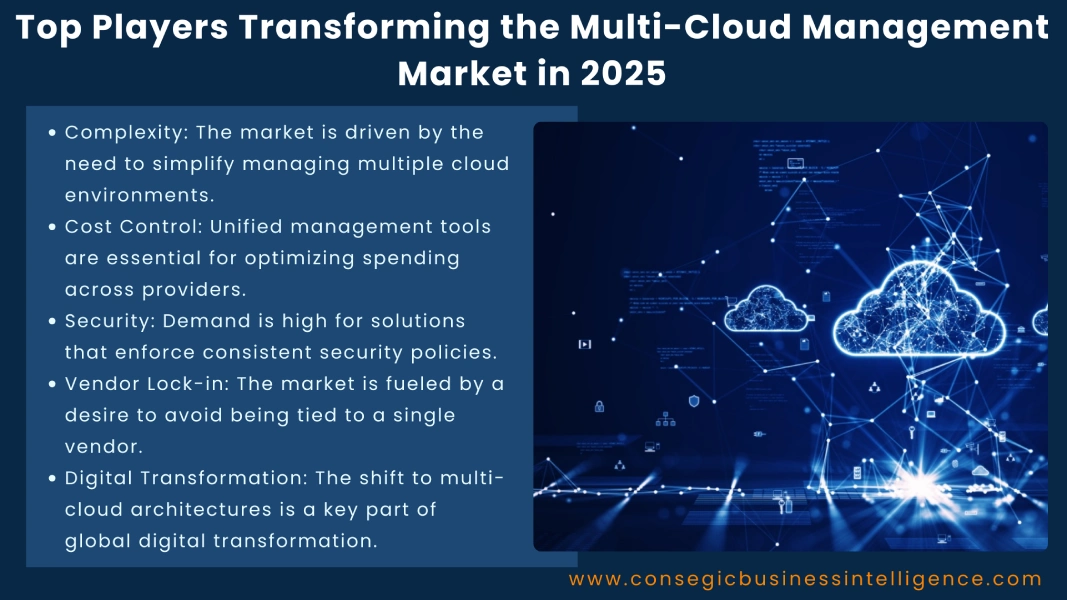Top Players Transforming the Multi-Cloud Management Market in 2025
The rapid adoption of multi-cloud strategies has reshaped enterprise IT. Organizations now run applications across public, private, and hybrid clouds to gain flexibility, avoid vendor lock-in, and optimize costs. However, managing multiple environments is complex, requiring unified governance, automation, and security. This challenge has fueled strong demand for the multi-cloud management market, creating opportunities for vendors that deliver seamless visibility, orchestration, and cost control.

Below are the 10 most prominent players globally transforming the multi-cloud management landscape in 2025.
- VMware
VMware remains a dominant global name in multi-cloud management. Its VMware Cloud and Tanzu portfolio provide enterprises with consistent operations across AWS, Azure, Google Cloud, and private environments. VMware’s hybrid approach, combined with strong tools for workload mobility, observability, and lifecycle management, ensures enterprises can unify operations while modernizing applications.
- Microsoft (Azure Arc)
Microsoft leverages its strong enterprise footprint with Azure Arc, which extends Azure services, policies, and governance across on-premises and other cloud providers. This unified approach allows organizations to apply consistent security and compliance controls across hybrid and multi-cloud estates. With the scale of Azure and the integration with Microsoft 365, Microsoft is a global powerhouse in this space.
- Google Cloud (Anthos)
Google Cloud has positioned Anthos as a leading multi-cloud platform, focusing on Kubernetes orchestration, policy management, and application modernization. Anthos allows organizations to deploy and manage workloads across Google Cloud, AWS, and Azure with a single control plane. Google’s cloud-native expertise makes Anthos a strong choice for enterprises prioritizing innovation and application portability.
- Amazon Web Services (AWS Outposts and EKS Anywhere)
AWS, the largest public cloud provider, extends its influence into multi-cloud with AWS Outposts and EKS Anywhere. Outposts brings AWS infrastructure to on-premises and hybrid setups, while EKS Anywhere allows Kubernetes workloads to run outside AWS with consistent management. With its global scale and innovation, AWS continues to shape the future of hybrid and multi-cloud strategies.
- IBM (Red Hat OpenShift and Turbonomic)
IBM has built a strong global presence in multi-cloud management through Red Hat OpenShift and Turbonomic. OpenShift delivers a consistent Kubernetes platform across any cloud, while Turbonomic provides AI-driven workload automation to optimize performance and costs. IBM’s enterprise credibility and global reach make it a trusted partner for large-scale transformation projects.
- Cisco
Cisco plays a critical role in securing and connecting multi-cloud environments. Its portfolio spans SD-WAN, full-stack observability, and zero-trust security, helping enterprises ensure seamless connectivity and resilience. Cisco’s global presence and dominance in networking allow it to integrate multi-cloud infrastructure with security and performance visibility at scale.
- Oracle (Oracle Cloud Infrastructure with Multi-Cloud Partnerships)
Oracle has strengthened its global role in multi-cloud management through Oracle Cloud Infrastructure (OCI) and partnerships with Microsoft Azure for interoperability. Oracle provides specialized solutions for database-driven workloads that require resilience and low latency across hybrid and multi-cloud setups. Its focus on enterprise customers and critical workloads ensures Oracle remains a prominent global player.
- Dell Technologies
Dell Technologies brings multi-cloud capabilities through its APEX as-a-Service portfolio and VMware synergies. Dell provides infrastructure and cloud management solutions that integrate seamlessly with hyperscale providers, enabling hybrid flexibility. With its global customer base and strong enterprise focus, Dell continues to influence the multi-cloud management ecosystem.
- Hewlett Packard Enterprise (HPE GreenLake)
HPE GreenLake has become a global leader in hybrid and multi-cloud service delivery. Its platform offers on-demand IT consumption with unified management across private and public environments. HPE’s strength lies in combining infrastructure, software, and managed services, giving enterprises the flexibility to scale workloads across multiple environments seamlessly.
- Alibaba Cloud
As Asia’s largest cloud provider and a global contender, Alibaba Cloud has advanced its multi-cloud management solutions to compete with Western hyperscalers. With strong offerings in hybrid deployment, container management, and cost optimization, Alibaba Cloud is expanding its footprint globally, making it a prominent player in the competitive multi-cloud landscape.
Conclusion
The multi-cloud management market in 2025 is shaped by global leaders that combine automation, orchestration, security, and cost governance. Companies such as VMware, Microsoft, Google, AWS, IBM, Cisco, Oracle, Dell Technologies, HPE, and Alibaba Cloud are driving innovation and ensuring enterprises can harness the full potential of multi-cloud strategies. With growing demand for flexibility and efficiency, these providers are set to define the future of enterprise IT worldwide.
